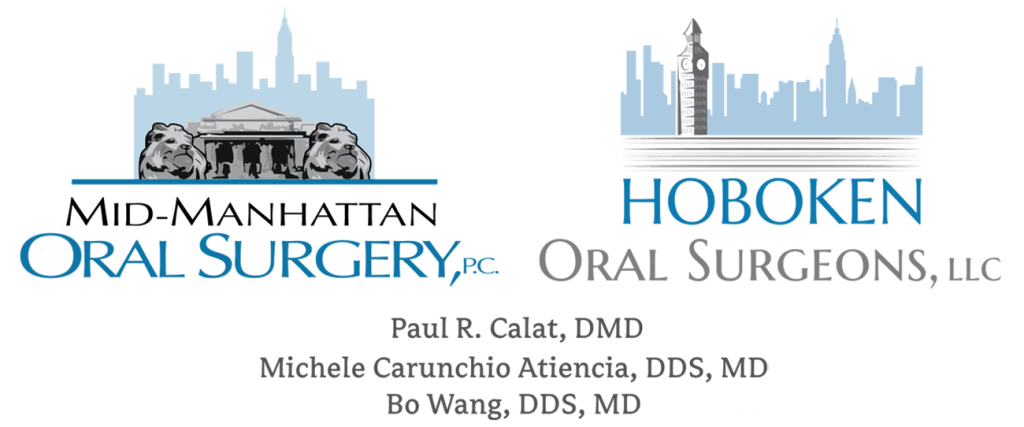Apicoectomies in Midtown Manhattan, NYC
Mid-Manhattan Oral Surgery and Hoboken Oral Surgeons offer apicoectomies in New York City and Hoboken, NJ. To schedule an appointment call 212-696-2677 (Manhattan) or 201-659-6999 (Hoboken).
If you have been told you need an apicoectomy, we’re happy to talk with you about what the procedure involves, if it’s the right option for you and what to expect from the procedure. Here is what you should know.
What Is an Apicoectomy?
An apicoectomy is performed on a tooth that remains infected after root canal treatment. In some cases, the root canal can be retreated before an apicoectomy is considered. However, this is not practical on a tooth that is covered by a crown or bridge, as root canal retreatment would damage the restoration. Therefore, in this situation, apicoectomy is generally the next step.
During the consultation, we may suggest taking a 3D x-ray (dental CT Scan) which will provide more information than a traditional dental x-ray. In some cases, an apicoectomy may not be a good choice if the prognosis of the tooth being saved is poor. In this case we may suggest having the tooth extracted, the site thoroughly cleaned and planning for a dental implant.
An apicoectomy is a form of endodontic (root canal) surgery. We will remove the tip of the root along with any root branches that still harbor infection. This is often the only way to remove stubborn infection that remains after one or two root canal treatments.
Note that an apicoectomy is different from a root resection. It removes only the root tip, while a root resection removes the entire tooth root.
Preparing for an Apicoectomy
We will take additional x-rays of the tooth and surrounding bone, and review your medical history to determine if you need any extra preparation for the surgery. You may be given an antimicrobial mouth rinse, anti-inflammatory medications and/or antibiotics, depending on your individual situation.
What to Expect
After your mouth is thoroughly numbed, we will make a small incision in your gum tissue and drill into your tooth to access the root. We will cut away any remaining infected tissue as well as the tip of the root, and then carefully clean and seal the end of the tooth’s canal using a special microscope and ultrasonic instruments. We may take another x-ray to ensure that all of the infection is gone before stitching up your gums.
It normally takes approximately 60 minutes to complete an apicoectomy, depending on complexity. Front teeth are typically the fastest, while lower molars usually take more time.
After Care
You may receive pain medications and/or antibiotics, which should be taken as directed. In some cases, pain can be relieved with over the counter medications. Bruising and swelling are common, and are typically worst on the second day. Apply ice to the area, 20 minutes on and 20 minutes off, for the first 24 hours after surgery to minimize bruising and swelling. You may also experience some decreased sensation in the affected area, which should resolve with time..
Avoid smoking and eating hard foods for at least 24 hours. Do not brush the surgery site or vigorously rinse your mouth on the first day. Be gentle around the site until the stitches are removed or dissolve at 5 to 7 days post-surgery. Most people feel significantly better within a day or two, but it may take two weeks for all traces of swelling or soreness to entirely fade.
Risks
Although apicoectomies are generally considered safe, no surgery is risk-free. The biggest risk is that the surgery will not solve the problem and the tooth will need extraction. There is also a slight risk of infection, which could travel to your sinuses if the tooth is located in the back of the upper jaw. If the tooth is in the back of the lower jaw, there is a very small risk of nerve damage.
Apicoectomies are relatively common, but it’s rate of success varies depending on the situation. After the procedure, the site of the procedure should be monitored periodically to make sure it’s healing properly.
Note About Anesthesia
You will have the option to have your procedure performed with local anesthesia, where we
thoroughly numb the area. Or you may choose to have your procedure performed with IV sedation anesthesia and local anesthesia. The primary difference, is that with IV sedation you are safely asleep for the local anesthesia injections and the procedure.
Contact Us
If you need an apicoectomy and are in Manhattan or Hoboken, we invite you to schedule a consultation. Call our office at 212-696-2677 (Manhattan) or 201-659-6999 (Hoboken) today.

